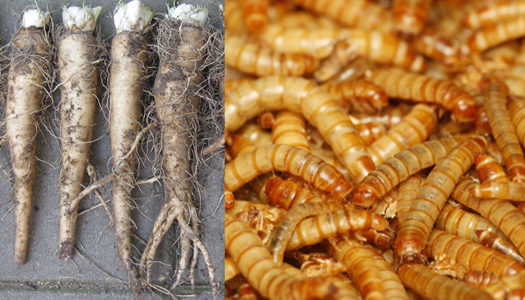We know that insects consist of fats, proteins and chitin that can be used in the food and feed industry and in the chemical and pharmaceutical sector. In addition, many species can be grown on low-quality organic residues. In this way, the insect sector can contribute to building a circular economy.
Herent Research Center responds to this and links research into a traditional vegetable such as chicory to insects that are an alternative sustainable raw material.
Every year, around 40,000 tonnes of chicory are produced in Belgium and 36,000 tonnes of chicory roots from the forcing industry. Today, this residual flow mainly ends up as feed in cattle stables, which generates little added value for the chicory grower. The Radius research group of Thomas Moore works actively on the valorisation of residual dreams with insects. Lotte Frooninckx (Radius) says: “Recent research shows that chicory roots have potential as feed for the cultivation of the mealworm Tenebrio molitor. Moreover, the chicory forcing areas proved to be an ideal environment for growing these mealworms. ”
Inagro in Belgium is also conducting experiments with chicory roots, both with mealworms and black soldier fly (Hermetia illucens) larvae. Their results showed that these roots are as valuable as a moisture source for mealworms as the currently applied carrots. Those carrots are also not of premium (shape) quality, however, they have more value as human food source. Therefore, replacing them by chicory roots increases sustainability. For black soldier fly larvae, the roots can provide necessary carbohydrates in feeding substrates composed primarily out of other crop residues. In addition, fermentation did not lower the value of the roots and can therefore be applied to preserve them longer.
